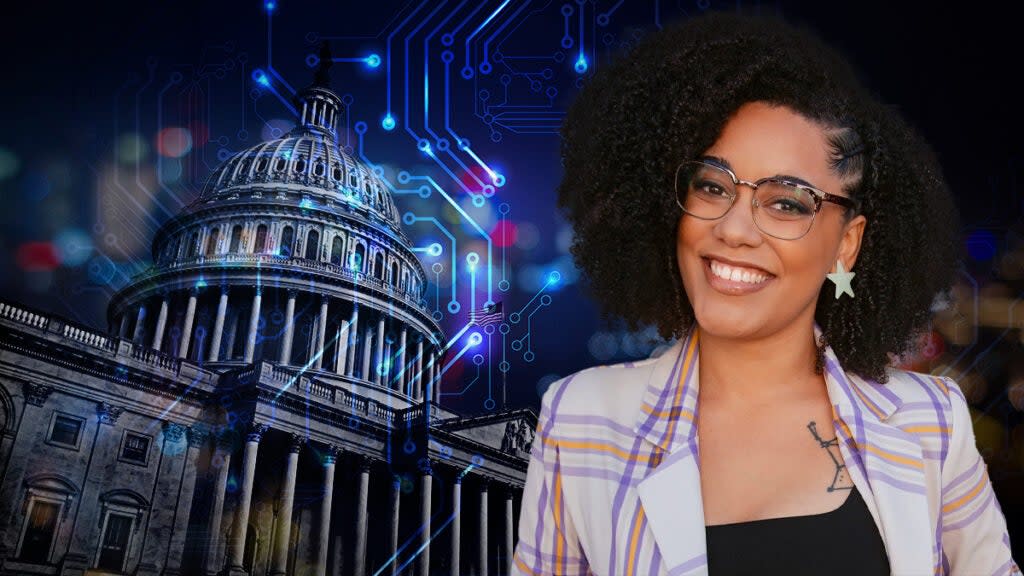Creators Now Have a Voice to Counter AI | PRO Insight

Creators didn’t make the Napster mistake with AI. Instead, they leaped into action soon after ChatGPT and other emerging AI tools rocked our world late last year. Inspired by proactive efforts in Europe to get ahead of AI on the regulatory front, a wide swath of artist organizations banded together here in the U.S. to create the Human Artistry Campaign, a new coalition to represent their interests in the realm of AI.
Now the campaign has hired astrophysicist and folk artist Moiya McTier as its explainer-in-chief. McTier is the ideal single voice of advocacy for the pan-media coalition, which operates by consensus, because she creates content across multiple forms of media herself. In her first major interview, McTier and I discussed myriad issues, including the current strikes.
It’s an apt time for the coalition to gain a recognizable face. McTier’s title isn’t CEO or executive director, because the Campaign isn’t that kind of organization, but the group is growing in clout and reach. Early members of the Campaign were mostly on the music side, but players of all types have signed on as the effort coalesced. (They include SAG-AFTRA, but not yet the WGA.)
They understand that numbers equal power and influence. The global organization now counts 150 members across 33 countries, and just yesterday welcomed its first AI-powered creative technology member, BandLab, to the fold.
Notably absent from the coalition’s membership ranks, in line with the great divide that the Hollywood strikes have laid bare, are the major studios and streamers. They have refused to sign onto the Campaign’s seven core principles, despite the fact that its first principle is for creators to accept AI, not reject it. “We embrace these technological advances,” it reads. Where the studios might differ is Principle No. 5: “We must ensure that human creators are paid for their work.”
McTier pointed out that she hasn’t been privy to any conversations between the guilds and the studios — not that they seem to be talking that much anyway. But the Campaign supports the striking writers and actors and their positions with respect to what she calls the “three Cs” — consent, compensation and credit.
There are some promising signs on the AI front. On July 18, the AMPTP issued a press statement saying that the group which represents the studios “agrees with SAG-AFTRA that use of a performer’s likeness to generate a new performance requires consent and compensation.” Notably, it said that its position applies to both “background actors as well as principal performers.” Sadly, there seems to be too much of a divide on other issues to make progress on this one, as a recent attempt to resume talks with the WGA failed.
I asked McTier about Disney CEO Bob Iger’s recent statements about the strike — most pointedly, that strikers are being “just not realistic” about their demands.
“If anything, he is the one being unreasonable because without the writers and the actors and all the other people who work on a set to make art come true, then he wouldn’t have a job,” she told me. “Humanity needs art to function. It entertains us, it drives us, it motivates us and it heals our wounds. If we have a society where people aren’t allowed to create art in any sort of unfettered, genuine way, our society will suffer.”
In line with the Campaign’s three Cs, one related goal is for Congress to create a new federal right of publicity to address AI’s use of individual likenesses and voices. McTier told me that she sees progress with a surprisingly bipartisan group of politicians before whom she recently testified.
Perhaps members of the House and Senate personally relate to the issues involved, since deepfakes and other unauthorized uses of their personas have already emerged and could proliferate in upcoming elections, a scary prospect for our democracy.
Congress appreciates the fact that it can listen to one voice that represents the interests of creators, learn from them and then set policy guardrails on the proliferation of AI, McTier told me. Enactment of a publicity right is one such guardrail. Limiting copyright to human works is another. (So far, the Copyright Office has resisted granting protection to purely AI-generated works, but there are already legal disputes over this stance.)
The Campaign supports all creators, not just those in the motion picture industry. One of its key issues is to push back hard on the concept that AI can train algorithms on copyrighted works without explicit consent. It seeks transparency in those algorithms and an opt-in system of the kind created by entertainment-driven AI pioneer Lore Machine, about which I have written.
It also seeks firm commitments on the part of the AI pioneers that are transforming the arts. That’s what makes BandLab’s addition to the coalition’s membership notable.
“We applaud BandLab Technologies’ leadership,” McTier said. “We look forward to additional companies committing to responsible AI practices that respect artists’ rights, names, images, likenesses, voices and individuality.”
Ultimately, the Campaign exists, in the words of its Principle No. 7, to give creators of all stripes “a seat at the table in any conversations regarding legislation, regulations or government priorities regarding AI that would impact their creativity and the way it affects their industry and livelihood.”
“If we’re not already the go-to resource, we will be,” McTier said. Her arrival may be the moment that clinches this.
For those of you interested in learning more, visit Peter’s firm Creative Media at creativemedia.biz and follow him on X/Twitter (@pcsathy).
The post Creators Now Have a Voice to Counter AI | PRO Insight appeared first on TheWrap.


